Pam Lecky's Blog, page 9
June 2, 2023
Cold Blows the Wind by Catherine Meyrick: The Coffee Pot Book Club Blog Tour
Today, I am delighted to host Catherine Meyrick for the blog tour for Cold Blows the Wind. Catherine has kindly provided an excerpt to whet your appetite.
You can follow the full tour here: https://thecoffeepotbookclub.blogspot.com/2023/04/blog-tour-cold-blows-the-wind.html
Cold Blows the Wind by Catherine MeyrickHobart Town 1878 – a vibrant town drawing people from every corner of the earth where, with confidence and a flair for storytelling, a person can be whoever he or she wants. Almost.
Ellen Thompson is young, vivacious and unmarried, with a six-month-old baby. Despite her fierce attachment to her family, boisterous and unashamed of their convict origins, Ellen dreams of marriage and disappearing into the ranks of the respectable. Then she meets Harry Woods.
Harry, newly arrived in Hobart Town from Western Australia, has come to help his aging father, ‘the Old Man of the Mountain’ who for more than twenty years has guided climbers on Mount Wellington. Harry sees in Ellen a chance to remake his life.
But, in Hobart Town, the past is never far away, never truly forgotten. When the past collides with Ellen’s dreams, she is forced to confront everything in life a woman fears most.
Based on a period in the lives of the author’s great-great-grandparents, Sarah Ellen Thompson and Henry Watkins Woods, Cold Blows the Wind is not a romance but it is a story of love – a mother’s love for her children, a woman’s love for her family and, those most troublesome loves of all, for the men in her life. It is a story of the enduring strength of the human spirit.

Buy Links:
Universal Link: https://books2read.com/ColdBlowstheWind
An Excerpt from Cold Blows the Wind‘Harry, meet Bill and George Thompson.’ His father turned back to the two men. ‘My son, Harry Woods the younger.’
The elder man held out his hand. ‘Pleased to meet you, Harry the younger.’ He waved his hand towards the group of women. ‘And these are my lady and my daughters.’
Harry raised his hat to Mrs Thompson, a tiny woman shorter even than Grannie, who had joined the men. The three younger girls gave Harry a passing glance, more interested in the antics of the baby they had with them, a sturdy child of around six months, who was trying to stand on the youngest and pull her fringe. The baby fell back in her lap and began to cry. The woman Harry supposed was the child’s mother held out her arms and the youngest girl passed the baby to her. She seemed to be aware of Harry’s gaze and glanced across at him. She was pleasant looking, her face made for smiling. His stomach gave an unexpected lurch. He shook his head to clear it—she must be George Thompson’s wife.
Bill Thompson passed a flask around, Mrs Thompson and Grannie both making sure they got their share. Harry took a swig. He was hungry and would have preferred a cup of tea.
The young woman smiled at him. ‘Should you be having that on an empty stomach, Mr Woods?’ She stood, the child on her hip, and picked up a tin. ‘Here, have a sandwich.’ The scent of roses washed over him. He closed his eyes a moment. The memory of Eliza’s gentle violet perfume faded.
‘Thank you.’ He took a sandwich and sat on the bench by the door. At a loss for words, he bit into the sandwich: cheese and pickle. It disappeared in three bites—it had been a long time since breakfast.
‘Go on, have another.’ Mischief in her grey-blue eyes, she grinned as if she were flirting with him.
He glanced across at George who winked back. Harry’s eyes widened, unsure what was happening.
The baby started to wail. ‘Poor Billy is teething.’ The woman stuck her finger in the child’s mouth, rubbing his gums.
‘Don’t know much about babies,’ Harry said.
‘You have none yourself, Mr Woods?’
There had been no such blessing. ‘No, Mrs Thompson.’
‘No need to be formal. I’m Sarah Ellen but family call me Ellen, you can too.’
He wasn’t being drawn into this game. ‘Your husband might have something to say about that.’ He glanced at George again.
‘My husband? Oh, you mean George?’ Her laughter pealed around the clearing. ‘He’s my brother. No Billy’s father ran a mile when he heard Billy was on the way. Afraid Will, my other brother, would give him a right thumping. Bastard!’ She said the word under her breath.
Harry blinked. He had never heard a decent woman speak like that before. His pulse bounced surprisingly.
‘So where are you from, Mr Woods?’
Even when she wasn’t smiling, there was amusement in her eyes. Her skin was clear and unblemished, her lips perfect.
He realised he was sitting dumb, staring at her. Her chin had the slightest dimple.
‘I’m from Perth but born in Fremantle on the other side of the Swan River.’ He stopped. Why was he giving her his life story? ‘If I’m to call you Ellen, you should call me Harry.’ He smiled—he couldn’t stop himself.
‘Oh, I will.’ Her eyelashes fluttered lightly. ‘Are Mr and Mrs Woods from Perth too?’
‘My father was there from the start of settlement. Mrs Woods is his second wife, he met her here.’
The baby began grizzling again. Ellen looked down, rocking him in her arms. ‘My little darling needs a sleep.’
He watched her walk away towards her sisters—the straightness of her back, the tilt of her head, the sway of her hips.
Harry got up and helped himself to a cup of Grannie’s stewed tea and one of the scones set out on a plate. He had finished when a small party arrived wanting to be taken to the pinnacle.
As he moved off with them, Ellen gave Harry a dazzling smile. He grinned back, aware of his own ridiculousness—he suspected he was near old enough to be her father.
A Little Bit About Catherine …
Catherine Meyrick is an Australian writer of romantic historical fiction. She lives in Melbourne but grew up in Ballarat, a large regional city steeped in history. Until recently she worked as a customer service librarian at her local library. She has a Master of Arts in history and is also an obsessive genealogist.
When she is not writing, reading and researching, Catherine enjoys gardening, the cinema and music of all sorts from early music and classical to folk and country & western. And, not least, taking photos of the family cat to post on Instagram.
Social Media Links:Website: https://catherinemeyrick.com/
Twitter: https://twitter.com/cameyrick1
Facebook: https://www.facebook.com/CatherineMeyrickAuthor
Instagram: https://www.instagram.com/catherinemeyrickhistorical/
Pinterest: https://www.pinterest.com.au/catherinemeyrick15/
Book Bub: https://www.bookbub.com/authors/catherine-meyrick
Amazon Author Page: https://www.amazon.com/stores/author/B07B8VXWYQ
Goodreads: https://www.goodreads.com/author/show/17798235.Catherine_Meyrick
June 1, 2023
Historical Fiction Author of the Month: Brook Allen
Welcome to my Blog Series, Historical Fiction Author of the Month.
Each month, I will showcase a different historical fiction author. Their books will range from romance to mystery and adventure to crime, and will be from many different eras. I hope you discover a new author and their work to enjoy. Happy reading!
In this post, I am delighted to feature author Brook Allen.
Brook Allen Brook Allen
Brook AllenAuthor Brook Allen has a passion for ancient history—especially 1st century BC Rome. Her Antonius Trilogy is a detailed account of the life of Marcus Antonius—Marc Antony. The first installment, Antonius: Son of Rome was published in March 2019. It follows Antony as a young man, from the age of eleven until he’s twenty-seven and meets Cleopatra. Brook’s second book is Antonius: Second in Command, dealing with Antony’s rise to power at Caesar’s side and the civil war against Brutus and Cassius. Antonius: Soldier of Fate spotlights the romance between Antonius and Cleopatra and the historic war with Octavian Caesar.
In 2019, Son of Rome won the Coffee Pot Book Club Book of the Year Award. In 2020, it was honored with a silver medal in the international Reader’s Favorite Book Reviewers Book Awards and won First Place in the prestigious Chaucer Division in the Chanticleer International Book Awards, 2020.
Brook is currently working on a new project a little closer to home. Her upcoming work takes place in early 19th century Virginia.
Brook has always loved writing. She completed a Masters program at Hollins University with an emphasis in Ancient Roman studies. She lives in the heart of southwest Virginia in the scenic Blue Ridge Mountains with her husband and black dog, Jak.
What is a typical writing day like for you?
Due to my day job, my writing times are few and far between. It’s usually after dinner that I’m able to sit down and write for 90 minutes or so. And of course, I have weekends, too. During the summer, I am off work, so that time is mighty precious for writing. It’s not an easy thing to juggle a full-time job and stay self-disciplined enough to make my writing count. But when writing is your joy and such a part of you that you miss doing it when you’re not—then it’s achievable.
Explore Brook’s BooksSon of Rome: Desperate to redeem his name, young Marcus Antonius is determined to redeem himself. He refuses to let warring rebels, scheming politicians, or even an alluring young Egyptian princess stand in his way. Buy Link: https://mybook.to/0HMl
Second in Command: As civil war again looms during the crisis following the Ides of March, Marcus must don the mantle of ruthlessness to carve his own legacy in Rome’s history. Enemies have been made, wills have been read, and heirs proclaimed. But in Rome, blood answers only to blood. Buy Link: https://mybook.to/FQ9CeKf
Soldier of Fate: As his rival’s star rises, Marcus is embroiled in a bitter struggle threatening to end their unity. He is a man torn between two countries and two families, and ultimately—a soldier fated to be the catalyst transforming Rome from Republic to Empire. Buy Link: https://mybook.to/5bIc
~Allen deftly paints a vivid picture of Republican Rome (not the paradise later proponents worshiped), of its snake pit politics, of daily life in Roman households, and of the treacheries and shifting alliances in the eastern provinces.~
Margaret George, Bestselling author of The Memoirs of Cleopatra
You can find out more about Brook and her work by checking out her social media links below:
EMAIL: 1brook.allen@gmail.com
WEBSITE: https://www.brookallenauthor.com/
TWITTER: https://twitter.com/1BrookAllen
FACEBOOK: https://www.facebook.com/Historical.FictionWriter/photos/a.1921073788134240/274856848538 4762/
GOODREADS: https://www.goodreads.com/author/dashboard?ref=nav_profile_authordash
INSTAGRAM: https://www.instagram.com/brookallen54/
Next month’s author will be Liz St. JohnMay 25, 2023
The Devil’s Glove by Lucretia Grindle: The Coffee Pot Book Blog Tour
Today, I am delighted to host Lucretia Grindle on her book blog tour for The Devil’s Glove. Lucretia has kindly provided an excerpt (please see below).
You can follow the full tour here: Blog Tour Page: https://thecoffeepotbookclub.blogspot.com/2023/04/blog-tour-the-devils-glove.html
The Devil’s Glove by Lucretia GrindleNorthern New England, summer, 1688.
Salem started here.
A suspicious death. A rumor of war. Whispers of witchcraft.
Perched on the brink of disaster, Resolve Hammond and her mother, Deliverance, struggle to survive in their isolated coastal village. They’re known as healers taught by the local tribes – and suspected of witchcraft by the local villagers.
Their precarious existence becomes even more chaotic when summoned to tend to a poisoned woman. As they uncover a web of dark secrets, rumors of war engulf the village, forcing the Hammonds to choose between loyalty to their native friends or the increasingly terrified settler community.
As Resolve is plagued by strange dreams, she questions everything she thought she knew – about her family, her closest friend, and even herself. If the truth comes to light, the repercussions will be felt far beyond the confines of this small settlement.
Based on meticulous research and inspired by the true story of the fear and suspicion that led to the Salem Witchcraft Trials, THE DEVIL’S GLOVE is a tale of betrayal, loyalty, and the power of secrets. Will Resolve be able to uncover the truth before the town tears itself apart, or will she become the next victim of the village’s dark and mysterious past?
Praise for The Devil’s Glove:
“From its opening lines this historical novel from Grindle (Villa Triste) grips with its rare blend of a powerfully evoked past, resonant characters, smart suspense, and prose touched with shivery poetry.”
~ BookLife Reviews Editor’s Pick
Buy Links:
This title is available to read on #KindleUnlimited.
Universal Link: https://books2read.com/u/4EN58l
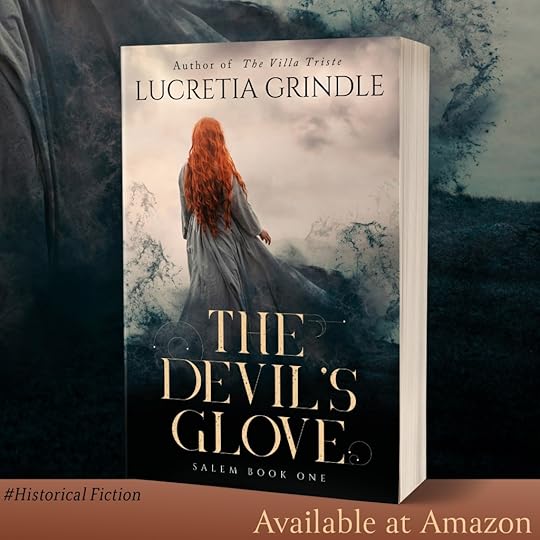 Excerpt from The Devil’s Glove by Lucretia Grindle
Excerpt from The Devil’s Glove by Lucretia GrindleWe are making bread in the kitchen, lifting the dough, folding and banging it on the scrubbed surface of the table when my mother and I hear a voice ask, “Do you know me, Mistress?”
As one, we spin around.
Neither of us has said so, but we have been waiting for John Alden. Watching for his familiar form to stride down the meadow path, or appear like something conjured in the doorway telling us his errand is achieved, that Madockawando and Saint Castin have no interest in wars or raids. That we are safe.
But this is not John Alden. The man standing in our kitchen door is not much more than a boy. He has doffed his old hat and twists it as if he could wring words from it, make it speak for him instead of having to speak himself. His boots are worn and his breeches, like his face, are filthy with dust. But it’s the hands that mark him as one of the militia. It’s the grease streaks and the powder burns, black and sore looking from the loading and re-loading.
More of them arrived yesterday. Like the rest of the town, Judah and I watched them pass. All shapes and sizes, some ragged, some short, others tall. Fat men and thin boys and men who look so ordinary it is hard to tell one from the other marched down Broad Street to the Fort with Captain Blackman riding at their head, his new boots and sun burned cheeks shining with importance.
Now this tall boy stands in our door-yard looking in at us, and suddenly, even though I have not seen him for years and have never so much as traded a word with him, I do know him. This is Thaddeus Hobbs. Avis’s oldest son. Abigail’s older brother.
My mother must see it at the same time, because she nods. Her hands hover over the dough on the table before she lowers them and wipes them on her apron.
“Master Hobbs,” my mother says. But she might as well have said, I’ve been waiting for you.
***
Sitting at our table, Thaddeus Hobbs watches me pour the pitcher of cider as if he has never seen the stuff before. As he takes the proffered cup, I see that his hands are shaking. He is exhausted. Or terrified. Or both. Perhaps his hair was once as gold as Abigail’s. Now, it is dirty brown and in need of a barber. His eyes are blue, but softer than his sister’s, almost gray. His linen shirt is old, and sticks to him, and smells. When he lowers the cup, I pour him another. He drinks that greedily, too.
My mother mounds the dough and places it in the waiting bowl to let it rise. She nods for me to take the bowl.
I am opening the cupboard door when I hear her say, “Your mother left the world in peace.” Which is a lie. “But they called me too late,” she adds. “There was little I could do for her.”
“Or the babe.”
It is not a question. I turn, and can see my mother’s face. She looks at Thaddeus Hobbs, considering, before she nods.
“No.” She agrees. “I could do nothing for the babe. How did you know? From your father?”
He shakes his head. “From my mother.”
The words hang in the room. And it is then, looking at Thaddeus Hobbs, that my mother and I understand. He knows. I do not know how, but Avis’ son knows that her death was not a natural one. Any doubt is dispelled by his next question.
“How?”
“Poison,” my mother says, after a moment. “Hellebore. In food. A stew or soup.”
“You are sure?” There is pain on his face, and also, strangely, something like relief. I do not understand why until he speaks again. “So, she was not witched?” He asks. “You are sure? You are certain of that, Mistress?”
“Witched?” My mother frowns. “Why would you think that?”
“Goody Skilling says it.”
My mother makes a face. “You have seen her?”
Thaddeus nods. “It was Goody Skilling, who told me you were at my mother’s death. She told me. Everything.”
My mother and I exchange a look. I cannot imagine what Goody Skilling’s ‘everything’ is, but I am quite certain it bears little resemblance to ours. I do not have time to ponder this, because suddenly Thaddeus Hobbs is babbling. Now that he has started, he cannot seem to stop. Words break from him like a dam giving way, tumbling and falling over one another, so roiled by the storm of his distress that their sense is hard to grasp.
“I heard the rumor, in Saco. Gossip said a woman had died here, witched. And I was afraid it was her. I wanted to come at once. But with all the trouble, I was not allowed. But I heard, and after the stories from Boston, I thought – people say, it travels. The witching travels, on the night air. And, I thought -” His words run dry, stopping almost as abruptly as they began.
My mother shakes her head. She reaches for the stool that sits beside the hearth, pulls it in front of Thaddeus Hobbs’ chair and sinks down. Taking both of his hands, holding them gently so as not to worry the burns, she looks straight into his face.
“Your mother was not witched, Thaddeus. We, too have heard the gossip.”
Of course we have. The whole world has heard how the children of a Boston family have been struck. All of them witched. Writhing in pain, and shouting, and rushing about as if their wits have been snatched and put in the Devil’s hands.
“This is not what happened here,” my mothers says, her eyes never leaving his. “Your mother’s soul was never in danger.”
Now I understand the look of relief that came over him when she told him about the hellebore. Thaddeus Hobbs has been carrying the burden of his mother’s soul, the fear that it was taken from her and she is wandering in torment, searching and searching for it in the wilderness of The Damned.
“Your mother was not witched,” my mother repeats. “She was taken from this world before her time, it is true. But by poison. Not witching. By the time I was sent for, it was too late. There was nothing I could do.”
After a moment, Thaddeus nods. His next words sound as if he is pulling them from his very depths. As if they are heavy and tied to a rope he is hauling hand over hand.
“It need not have been evil. It could have been in error.”
The hope in the words is palpable. My mother says nothing. I know what she is doing – giving him the place in his mind to believe what he will, to believe what will give him peace. But peace is not what Thaddeus Hobbs wants. His next words freeze me to the floor.
“My mother’s death could have been an error,” he says. “But it was not.”
A Little Bit About Lucretia …Lucretia Grindle grew up and went to school and university in England and the United States. After a brief career in journalism, she worked for The United States Equestrian Team organizing ‘kids and ponies,’ and for the Canadian Equestrian Team. For ten years, she produced and owned Three Day Event horses that competed at The World Games, The European Games and the Atlanta Olympics. In 1997, she packed a five mule train across 250 miles of what is now Grasslands National Park on the Saskatchewan/Montana border tracing the history of her mother’s family who descend from both the Sitting Bull Sioux and the first officers of the Canadian Mounties.
 Lucretia Grindle
Lucretia GrindleReturning to graduate school as a ‘mature student’, Lucretia completed an MA in Biography and Non-Fiction at The University of East Anglia where her work, FIREFLIES, won the Lorna Sage Prize. Specializing in the 19th century Canadian West, the Plains Tribes, and American Indigenous and Women’s History, she is currently finishing her PhD dissertation at The University of Maine.
Lucretia is the author of the psychological thrillers, THE NIGHTSPINNERS, shortlisted for the Steel Dagger Award, and THE FACES of ANGELS, one of BBC FrontRow’s six best books of the year, shortlisted for the Edgar Award. Her historical fiction includes, THE VILLA TRISTE, a novel of the Italian Partisans in World War II, a finalist for the Gold Dagger Award, and THE LOST DAUGHTER, a fictionalized account of the Aldo Moro kidnapping. She has been fortunate enough to be awarded fellowships at The Hedgebrook Foundation, The Hawthornden Foundation, The Hambidge Foundation, The American Academy in Paris, and to be the Writer in Residence at The Wallace Stegner Foundation. A television drama based on her research and journey across Grasslands is currently in development. THE DEVIL’S GLOVE and the concluding books of THE SALEM TRILOGY are drawn from her research at The University of Maine where Lucretia is grateful to have been a fellow at the Canadian American Foundation.
She and her husband, David Lutyens, live in Shropshire.
Social Media Links:
Website: http://LucretiaGrindle.com
Facebook: https://www.facebook.com/BookWhisperer.ink
LinkedIn: https://www.linkedin.com/company/bookwhisperer/
Instagram: https://www.instagram.com/bookwhispererink/
Amazon Author Page: https://www.amazon.com/author/lucretiagrindle Goodreads: https://www.goodreads.com/author/show/827521.Lucretia_Grindle
May 2, 2023
Historical Fiction Author of the Month: Antoine Vanner
Welcome to my Blog Series, Historical Fiction Author of the Month.
Each month, I will showcase a different historical fiction author. Their books will range from romance to mystery and adventure to crime, and will be from many different eras. I hope you discover a new author and their work to enjoy. Happy reading!
In this post, I am delighted to feature author Antoine Vanner.
Antoine Vanner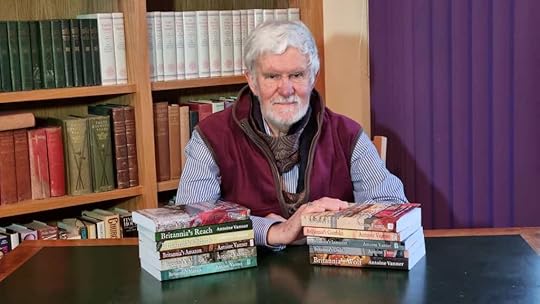 Antoine Vanner
Antoine VannerAntoine Vanner had a long career, mostly at a senior executive level, in one of the world’s largest multinationals. This involved residence and work in eight countries and short assignments in a dozen others. He worked In retirement as a part-time academic in the US, UK, Philippines and Latin America. Life threatening experiences included management in the midst of a vicious terrorist campaign in which business activities, and once himself personally, were targets. Also held on one at knifepoint, beaten with rifle-butts and made a 200-yard sprint under AK-47 fire at the age of 60 (when “retired”), not to mention more mundane risks such as storms at sea and life in the corporate world. He’s had a half-century love affair with Africa, living for a total of a decade in one country there and visiting nine others. In retirement, provided pro-bone advice on certain policy matters to several African leaders. All this was a splendid preparation for writing! Vanner is at home in two languages, competent in a third and very rusty in two more. He now lives in rural Britain with his wife, dog and eight horses (his wife’s main interest). His main interest is, and always has been, history, especially of the 19th Century.
I’m sure readers are curious to know what enticed you to write in this genre in particular, Antoine?I became addicted to the novels of C.S. Forester from boyhood – my father introduced me to Hornblower with the Happy Return when I was eleven. I loved Forester’s style and the theme in all his novels (and he covered a huge range outside the Hornblower series) of the Man Alone who must be a leader, carry heavy burdens of responsibility, must take hard decisions when there is nobody to turn to for advice and knows that his superiors will throw him to the dogs if things go badly. I always aspired to write on the same theme. Combining this with my interest in the 19th Century and its vast political, social, scientific, medical and technological advances led to my creation of Nicholas Dawlish, a Royal Navy officer born in 1845 and dying in 1918 who finds himself involved not just in maritime but in political events of his time, many of them obscure. By sheer coincidence, these are mostly set in locales I’m familiar with from personal experience! A surprise for me was that his wife became such a strong character in her own right that she demanded two books in which she would be the protagonist. Linked to real life events also, in these she would find herself in a murky world of corruption, betrayal and espionage. Eleven books so far and a twelfth underway. Free short stories for mailing-list members fill in gaps between novels.
Explore Antoine’s Books
Adventure by land and sea in the Late-Victorian Era.
Battle, intrigue, mystery, loyalty, courage, deception, atrocity, ethical dilemmas . . .
The lives of an ambitious Royal Navy officer and his indomitable wife.
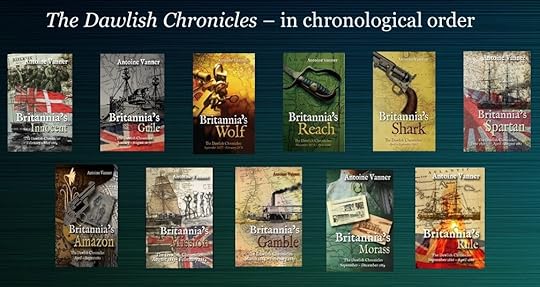

You can find all of Antoine’s books here: https://bit.ly/3nG9epE
You can find out more about Antoine and his work by checking out his social media links below:
Facebook: Dawlish Chronicles
Twitter: Antoine Vanner
Website, Book Details: https://dawlishchronicles.com/books/
Free Short Stories and Mailing List: https://bit.ly/3igvA9f
Next month’s author will be Brook AllenMay 1, 2023
The Queen’s Scribe by Amy Maroney: The Coffee Pot Book Blog Tour
A broken promise. A bitter conflict. And a woman’s elusive chance to love or die.
1458. Young Frenchwoman Estelle de Montavon sails to Cyprus imagining a bright future as tutor to a princess. Instead, she is betrayed by those she loves most—and forced into a dangerous new world of scheming courtiers, vicious power struggles, and the terrifying threat of war.
Determined to flee, Estelle enlists the help of an attractive and mysterious falconer. But on the eve of her escape, fortune’s wheel turns again. She gains entry to Queen Charlotta’s inner circle as a trusted scribe and interpreter, fighting her way to dizzying heights of influence.
Enemies old and new rise from the shadows as Estelle navigates a royal game of cat and mouse between the queen and her powerful half-brother, who wants the throne for himself.
When war comes to the island, Estelle faces a brutal reckoning for her loyalty to the queen. Will the impossible choice looming ahead be her doom—or her salvation?
With this richly-told story of courage, loyalty, and the sustaining power of love, Amy Maroney brings a mesmerizing and forgotten world to vivid life. The Queen’s Scribe is a stand-alone novel in the Sea and Stone Chronicles collection.
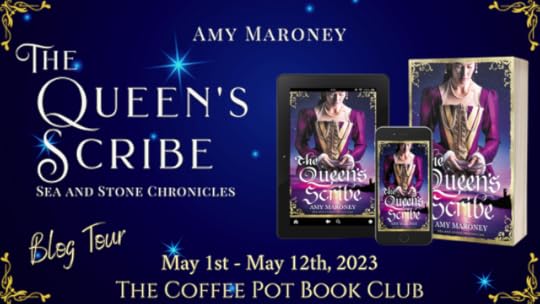
Praise for the Sea and Stone Chronicles:
“Island of Gold is a nimbly told story with impeccable pacing.”
—Historical Novel Society, Editor’s Choice Review
“Sea of Shadows is stunning. A compelling tale of love, honor, and conviction.”
—Reader’s Favorite Review
Amy Maroney is the author of the award-winning Miramonde Series, the story of a Renaissance-era female artist and the modern day scholar on her trail.
Buy Links:
This title is available to read on #KindleUnlimited.
Universal Link (if you have it): https://mybook.to/QueensScribe
A Little Bit About Amy …
Amy Maroney studied English Literature at Boston University and worked for many years as a writer and editor of nonfiction. She lives in Oregon, U.S.A. with her family. When she’s not diving down research rabbit holes, she enjoys hiking, dancing, traveling, and reading.
Amy is the author of The Miramonde Series, an Amazon-bestselling historical mystery trilogy about a Renaissance-era female artist and the modern-day scholar on her trail. Amy’s award-winning historical adventure/romance series, Sea and Stone Chronicles, is set in medieval Rhodes and Cyprus.
An enthusiastic advocate for independent publishing, Amy is a member of the Alliance of Independent Authors and the Historical Novel Society.
Social Media Links:
Website: https://www.amymaroney.com/
Twitter: https://twitter.com/wilaroney
Facebook: https://www.facebook.com/amymaroneyauthor
LinkedIn: https://www.linkedin.com/in/amy-maroney-582636b4/
Instagram: https://www.instagram.com/amymaroneywrites/
Pinterest: https://www.pinterest.com/amyloveshistory/
Book Bub: https://www.bookbub.com/authors/amy-maroney
Amazon Author Page: https://www.amazon.com/stores/Amy-Maroney/author/B01LYHPXEO
Goodreads: https://www.goodreads.com/author/show/15831603.Amy_Maroney
April 25, 2023
A Matter of Faith by Judith Arnopp: The Coffee Pot Book Blog Tour
I am delighted to host Judith Arnopp’s book spotlight tour with The Coffee Pot Book Blog. If you are a fan of the Tudor era, then this is a series you should check out.
You can follow the full tour here: https://thecoffeepotbookclub.blogspot.com/2023/03/blog-tour-a-matter-of-faith-by-judith-arnopp.html
A Matter of Faith: Henry VIII, the Days of the Phoenix, by Judith ArnoppFinally free of Catherine of Aragon, Henry VIII, is now married to Anne Boleyn and eagerly awaiting the birth of his son. In a court still reeling from the royal divorce and growing public resentment against church reform, Henry must negotiate widespread resentment toward Anne. He places all his hopes in a son to cement his Tudor blood line, but his dreams are shattered when Anne is delivered of a daughter.
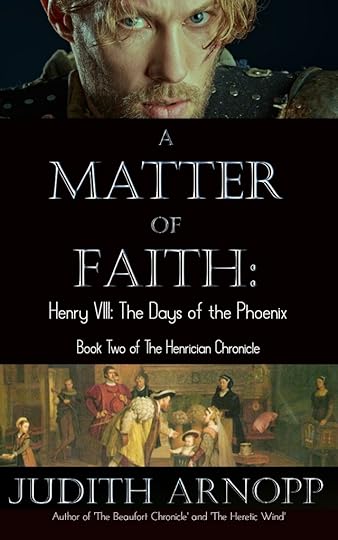
Burying his disappointment, Henry focuses on getting her with child again, but their marriage is volatile and as Henry faces personal bereavement, and discord at court, Anne’s enemies are gathering. When the queen miscarries of a son, and Henry suffers a life-threatening accident, his need for an heir becomes critical. Waiting in the wings is Jane Seymour, a lady-in-waiting who offers the king comfort and respite from Anne’s fiery passions.
Jane Seymour, stepping up to replace the fallen queen, quickly becomes pregnant. Delighted with his dull but fertile wife, Henry’s spirits rise even further when the prince is born safely. At last, Henry has all he desires but even as he celebrates, fate is preparing to deliver one more staggering blow.
But, when Anne falls foul of her former ally, Thomas Cromwell, and the king is persuaded he has been made a cuckold, Henry strikes out and the queen falls beneath the executioner’s sword, taking key players in Henry’s household with her.
Henry, the once perfect Renaissance prince, is now a damaged middle-aged man, disappointed in those around him but most of all in himself. As the king’s optimism diminishes, his intractability increases, and the wounded lion begins to roar.
Buy Links:
This title is available to read on #KindleUnlimited.
Universal Link: http://mybook.to/amofaith
A Little Bit about Judith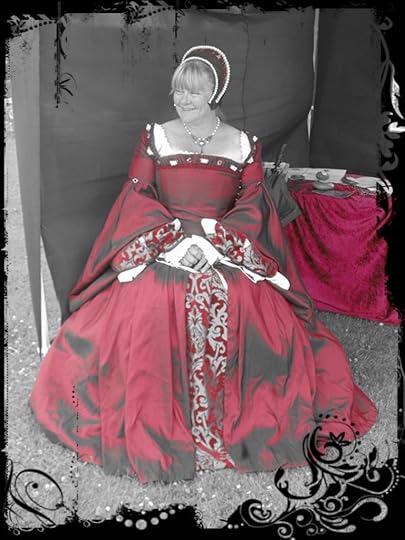
When Judith Arnopp began to write professionally there was no question as to which genre to choose. A lifelong history enthusiast and avid reader, Judith holds an honours degree in English and Creative writing, and a Masters in Medieval Studies, both from the University of Wales, Lampeter.
Judith writes both fiction and non-fiction, working full-time from her home overlooking Cardigan Bay in Wales where she crafts novels based in the Medieval and Tudor period. Her main focus is on the perspective of historical women from all roles of life, prostitutes to queens, but she has recently turned her attention to Henry VIII himself.
Her novels include:
A Matter of Conscience: Henry VIII, the Aragon Years. (Book one of The Henrician Chronicle)
A Matter of Faith: Henry VIII, the years of the Phoenix (Book Two of The Henrician Chronicle)
The Beaufort Bride: (Book one of The Beaufort Chronicle)
The Beaufort Woman: (Book two of The Beaufort Chronicle)
The Kings Mother: (Book three of The Beaufort Chronicle)
The Heretic Wind: the life of Mary Tudor, Queen of England
A Song of Sixpence: The story of Elizabeth of York
Intractable Heart: The story of Katheryn Parr
The Kiss of the Concubine: A story of Anne Boleyn
Sisters of Arden: on the pilgrimage of Grace
The Winchester Goose: at the court of Henry VIII
The Song of Heledd:
The Forest Dwellers
Peaceweaver
Her non-fiction articles feature in various historical anthologies and magazines and an illustrated non-fiction book, How to Dress like a Tudor will be published by Pen & Sword in 2023.
Social Media Links:
Website: https://www.judithmarnopp.com
Blog: http://juditharnoppnovelist.blogspot.co.uk/
Twitter: https://twitter.com/JudithArnopp
Facebook: https://www.facebook.com/thetudorworldofjuditharnopp
LinkedIn: https://www.linkedin.com/in/judith-arnopp-ba999025/
Instagram: https://www.instagram.com/tudor_juditharnopp/
Book Bub: https://www.bookbub.com/authors/judith-arnopp
Amazon Author Page: http://author.to/juditharnoppbooks
April 24, 2023
Inceptio by Alison Morton: The Coffee Pot Book Blog Tour
You can follow the full tour here: https://thecoffeepotbookclub.blogspot.com/2023/02/blog-tour-inceptio-10th-anniversary-edition.html
INCEPTIO (10th Anniversary hardback) by Alison Morton“It’s about Roman blood, survival and money. Mostly yours.”

In an alternative New York, Karen Brown is running for her life. She makes a snap decision to flee to Roma Nova – her dead mother’s homeland, the last remnant of the Roman Empire in the 21st century. But can Karen tough it out in such an alien culture? And with a crazy killer determined to terminate her for a very personal reason?
Stifled by the protective cocoon of her Roma Novan family, deceived by her new lover, she propels herself into a dangerous mission. But then the killer sets a trap – she must sacrifice herself for another – and she sees no escape.
A thriller laced with romance and coming of age, this first in series is Roman fiction brought into the 21st century through the lens of alternative history and driven by a female protagonist with heart and courage.

This 10thAnniversary hardback edition includes bonus content: Three character ‘conversations’, two short stories and the story behind INCEPTIO.
Buy links: INCEPTIO 10th Anniversary special edition hardback:
International Buy Link: https://mybook.to/INCEPTIOHardback
All other formats (ebook, paperback, audio)
Where to buy INCEPTIOA Little Bit About Alison …
Alison Morton writes award-winning thrillers featuring tough but compassionate heroines. Her ten-book Roma Nova series is set in an imaginary European country where a remnant of the ancient Roman Empire has survived into the 21st century and is ruled by women who face conspiracy, revolution and heartache but with a sharp line in dialogue. INCEPTIO starts the adventure…
 Alison Morton
Alison MortonShe blends her fascination for Ancient Rome with six years’ military service and a life of reading historical, crime and thriller fiction. On the way, she collected a BA in modern languages and an MA in history.
Six full-length Roma Nova novels, including INCEPTIO, have won the BRAG Medallion, the prestigious award for indie fiction. SUCCESSIO, AURELIA and INSURRECTIO were selected as Historical Novel Society’s Indie Editor’s Choices. AURELIA was a finalist in the 2016 HNS Indie Award. The Bookseller selected SUCCESSIO as Editor’s Choice in its inaugural indie review. The Historical Novel Society recently selected JULIA PRIMA, the first Foundation story set in the 4th century, the accolade of Editors’ Choice.
Alison lives in Poitou in France, the home of Mélisende, the heroine of her two contemporary thrillers, Double Identity and Double Pursuit. Oh, and she’s writing the next Roma Nova story.
Social media links:
Connect with Alison on her Roma Nova site: https://alison-morton.com
Facebook author page: https://www.facebook.com/AlisonMortonAuthor
Twitter: https://twitter.com/alison_morton
Alison’s writing blog: https://alisonmortonauthor.com
Instagram: https://www.instagram.com/alisonmortonauthor/
Goodreads: https://www.goodreads.com/author/show/5783095.Alison_Morton
Alison’s Amazon page: https://Author.to/AlisonMortonAmazon
Newsletter sign-up: https://www.alison-morton.com/newsletter/
April 13, 2023
The Kingmaking by Helen Hollick: The Coffee Pot Book Blog Tour
Today, I am delighted to host the fabulous and talented Helen Hollick for her special 30th Publication Anniversary and 70th Birthday Celebration!
You can follow the tour here: https://thecoffeepotbookclub.blogspot.com/2023/03/blog-tour-the-kingmaking-by-helen-hollick.html
The Kingmaking by Helen HollickNew Editions for 2023
(sadly, this edition is not available in USA/Canada)
The Kingmaking: Book One
Pendragon’s Banner: Book Two
Shadow of the King: Book Three
The Boy Who became a Man:
Who became a King:
Who became a Legend… KING ARTHUR
There is no Merlin, no sword in the stone, and no Lancelot.
Instead, the man who became our most enduring hero.
All knew the oath of allegiance:
‘To you, lord, I give my sword and shield, my heart and soul. To you, my Lord Pendragon, I give my life, to command as you will.’
This is the tale of Arthur made flesh and bone. Of the shaping of the man who became the legendary king; a man with dreams, ambitions and human flaws.
A man, a warlord, who united the collapsing province of post-Roman Britain,
who held the heart of the love of his life, Gwenhwyfar
– and who emerged as the most enduring hero of all time.
A different telling of the later Medieval tales.
This is the story of King Arthur as it might have really happened…
“If only all historical fiction could be this good.” Historical Novels Review
“… Juggles a large cast of characters and a bloody, tangled plot with great skill. ” Publishers Weekly
“Hollick’s writing is one of the best I’ve come across – her descriptions are so vivid it seems as if there’s a movie screen in front of you, playing out the scenes.” Passages To The Past
“Hollick adds her own unique twists and turns to the familiar mythology” Booklist
“Uniquely compelling… bound to have a lasting and resounding impact on Arthurian literature.” Books Magazine
(contains scenes of an adult nature)

Buy Links:
The Kingmaking is available to read on #KindleUnlimited.
Universal Link: https://mybook.to/TheKingmaking_Book1
A Little Bit about HelenHelen is celebrating her 70th birthday and thirty years as a published author. Her Pendragon’s Banner Trilogy, a fifth-century version of the Arthurian legend, was accepted for traditional publication in April 1993 by William Heinemann (Random House UK) a week after her 40th birthday. The Trilogy has been widely acclaimed since then – and gone through several different editions.

Helen moved from Random House UK in 2006 and went ‘Indie’, now in 2023 to celebrate she has brought out her own fabulous new editions! (The Trilogy is published mainstream by Sourcebooks Inc in USA/Canada. The publisher was offered the new cover designs for free, but declined.)
Helen became a USA Today Bestseller with her historical novel, The Forever Queen (titled A Hollow Crown in the UK) with the sequel, Harold the King (US: I Am The Chosen King) being novels that explore the events that led to the Battle of Hastings in 1066.
She writes a nautical adventure/fantasy Pirates of the Caribbean series, The Sea Witch Voyages and has also branched out into the quick read novella, ‘Cosy Mystery’ genre with her Jan Christopher Murder Mysteries, set in the 1970s, with the first in the series, A Mirror Murder incorporating her, often hilarious, memories of working as a library assistant.
Her non-fiction books are Pirates: Truth and Talesand Life of A Smuggler. She lives with her family in an eighteenth-century farmhouse in North Devon with a variety of pets and horses.
Social Media Links:
Website: https://helenhollick.net
Twitter: https://twitter.com/HelenHollick
Facebook: https://www.facebook.com/helen.hollick
Newsletter subscription: https://tinyletter.com/HelenHollick
Blog: https://ofhistoryandkings.blogspot.com/
Amazon Author Page: https://viewauthor.at/HelenHollick
Goodreads: https://www.goodreads.com/author/show/477847.Helen_Hollick
April 6, 2023
Cultybraggan: A Scottish WW2 PoW Camp
In a beautiful and scenic area of Perthshire, Scotland, between the Aberuchill Hills and the Water of Ruchill, is Cultybraggan PoW camp, known as Camp 21. Initially built in 1941, it was probably intended to be an army camp but instead became a camp for captured Italians. These Italians prisoners were used to supply manpower to the local farming, forestry and industry sectors.
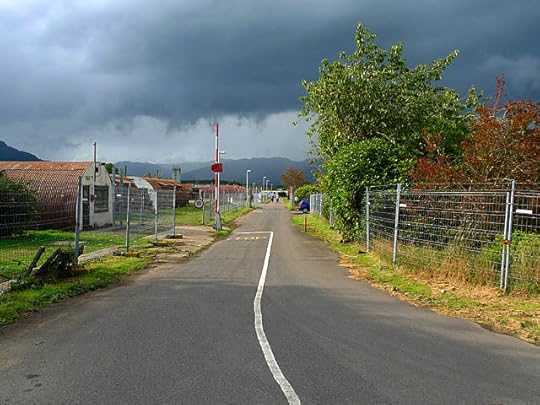 By Dr Richard Murray, CC BY-SA 2.0, https://commons.wikimedia.org/w/index.php?curid=14199292
By Dr Richard Murray, CC BY-SA 2.0, https://commons.wikimedia.org/w/index.php?curid=14199292That all changed in the latter part of 1943, when the camp was designated a ‘black camp’ by the British authorities. Due to the Geneva Convention, mixing of nationalities was prohibited, so the Italian prisoners were sent elsewhere. From then on, only Category A German prisoners were sent to the camp. These were the hardcore fanatical Nazi PoWs, mostly Waffen-SS, Fallschirmjäger (paratroops) and U-boat crew. These army, Kriegmarine, Luftwaffe, SS prisoners and officers were held in separate compounds, in an effort to break the power of the hardcore Nazis. Unlike their Italian counterparts, few mixed with the local community.
 Mick Garratt / Nissen Huts, Cultybraggan Camp
Mick Garratt / Nissen Huts, Cultybraggan CampThe prisoners were also segregated according to the level of threat they posed. The scale ranged from white to black. The whites were considered the least threatening, with some bearing special passes to work in the neighbouring farms. The greys were a risk, and the blacks were considered the most dangerous.
The prisoners were sent to Cultybraggan by ‘special train’ as far as the village of Comrie. From there they were marched for 30 minutes until they reached the camp. Locals told of hearing the German’s singing defiantly as they were marched through the countryside.
In 1944, the ringleaders of the Devizes plot, which hoped to break out 250,000 prisoners from camps across the UK, were imprisoned at Camp 21. One of the prisoners, Feldwebel Wolfgang Rosterg, an anti-Nazi was sent to the camp by mistake. He was murdered by inmates, and five of the prisoners were hanged for his murder, the largest multiple execution in 20th-century Britain. It is rumoured that Rudolph Hess was imprisoned here, but I am unable to confirm that is the case.
 Copyright: Comrie Community Organisation
Copyright: Comrie Community OrganisationThe camp ceased to be used by the military in 2004, and now belongs to the Comrie Development Trust, bought through a community right-to-buy option in 2007. The camp is now a tourist attraction and museum.
In the third book of the Sarah Gillespie series, The Last Letter from London, my heroine, who is an MI5 agent, must visit Cultybraggan, where a mysterious Frenchwoman, Adeline Vernier, claiming to be a double-agent, awaits processing. This meeting is the catalyst for a series of nail-biting adventures taking them to Lisbon, the centre of espionage in Europe during WW2, and ending dramatically in London.
The Normandy landings are at stake …
Can the double-agent be trusted and can her demands be met?
Will Sarah and Adeline survive?
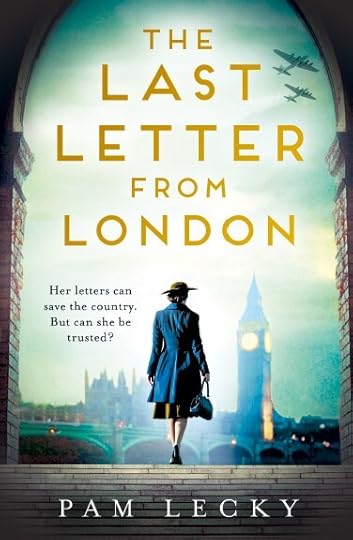
Pre-order is now live:
Amazon here
WHSmith here
Barnes & Noble here
April 1, 2023
Historical Fiction Author of the Month: Stella Riley
Welcome to my new Blog Series, Historical Fiction Author of the Month.
Each month, I will showcase a different historical fiction author. Their books will range from romance to mystery and adventure to crime, and will be from many different eras. I hope you discover a new author and their work to enjoy. Happy reading!
In this post, I am delighted to feature author Stella Riley.
Stella Riley Stella Riley
Stella RileyWinner of four gold medals for historical romance (Readers’ Favourite in 2019, Book Excellence Awards in 2020, Global Book Awards in 2022 and Book Excellence Award in 2023) and fourteen B.R.A.G. Medallions, Stella Riley lives in the beautiful medieval town of Sandwich in Kent.
She is fascinated by the English Civil Wars and has written six books set in that period. These, like the 7 book Rockliffe series (recommended in The Times newspaper!) and the Brandon Brothers trilogy, are all available in audio, narrated by Alex Wyndham.
Stella enjoys travel, reading, theatre, Baroque music and playing the harpsichord. She also has a fondness for men with long hair – hence her 17th and 18th century heroes.
I’m sure readers are curious to know what enticed you to write in this genre in particular, Stella?What drew me to the 17th century?
Looking way, way back, my interest began when I was about ten years old and I was given a copy of The Children of the New Forest by Captain Maryatt – and loved it. A few years later, I discovered and enjoyed other titles set in that period; Margaret Irwin’s Stuart quartet, beginning with The Stranger Prince, Georgette Heyer’s Royal Escape and Daphne du Maurier’s The King’s General, for example.
But it wasn’t until after my first novel had been published that my fascination for the English Civil Wars became serious.
It began like this. I was on a train back to Banbury after a meeting in London with my publisher when I found myself thinking of the Great Siege of Banbury Castle in 1644 – and suddenly realised it offered, not just the perfect back-drop, but a story all of its own. In addition to being geographically important, Banbury’s main task was to supply the Royalist capital at Oxford. The castle, taken by the Cavaliers at the start of the war in 1642, stood cheek-by-jowl with the intensely Puritan town. It was the ideal tapestry on which to weave political, military and religious conflict. All it needed, was an impossible love across a divide of class and loyalties. Better still, it was an aspect of the Civil War that had been largely ignored. It had everything!

A great idea – but there was just one problem. At that point, all I knew about the siege was that it had lasted fourteen weeks and that, by the end of it, the starving garrison had eaten all but two of the horses. I told myself not to worry about that – there would be books telling me everything I needed to know. I could research it.
Ah. Problem number two. We’re talking pre-internet here; and there weren’t books, plural. Only one book – A History of Banbury by Alfred Beesley, published in 1841 had what I needed. Nothing daunted, I asked my local branch library to get a copy of it – and they did. Problem number three was that it was a first edition sent up from the Bodleian Library in Oxford which, understandably, I wasn’t allowed to take home. I therefore spent every morning of the next few weeks in the library copying out page after page of Mr. Beesley; and every afternoon researching the progress of the war in general from books of my own at home … until I was finally ready to start writing and A Splendid Defiance was born.
(A footnote to this: A History of Banbury is now available to read on-line and there are a handful of very brief references to the siege on the internet.)
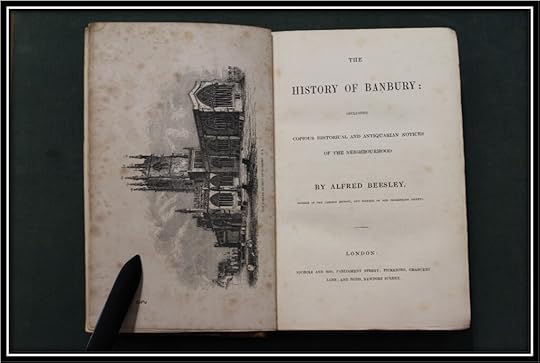
A Splendid Defiance was and still is very close to my heart for several reasons. The background story is a true one and I told it as it happened. It gave me the opportunity to feature well-known historical figures such as Rupert of the Rhine … but, along the way, I also met and grew fond of some of the ordinary soldiers garrisoning Banbury. They were real people too, but the ordinary folk who rarely find a place in the history books. Lieutenant-Colonel Anthony Greene, died of influenza just after the siege; Will Tyrwhitt who was sent to Banbury after losing an arm at Brentford; Colonel John Fiennes who had the thankless task of reclaiming the castle for the Parliament. Just three examples of many.
And one other who appears, not just in A Splendid Defiance but also in Garland of Straw and Lords of Misrule.
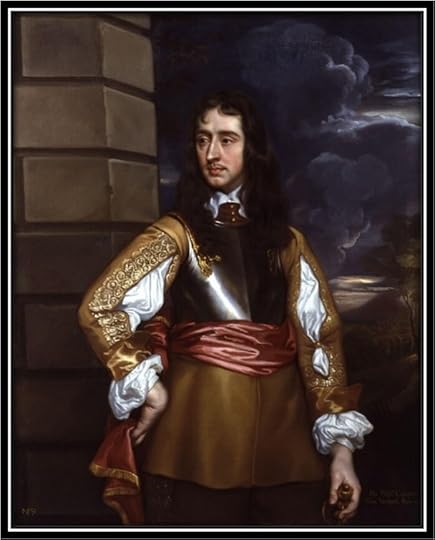
Sir William Compton; Governor of Banbury from 1642 at the age of seventeen, besieged at Colchester in 1648 and a founder member of the Sealed Knot in 1655. Quite a career for a gentleman most folk have never heard of … and one of many reasons this period of history is so rewarding.
Explore Stella’s Books
You can find all of Stella’s books here: Amazon
You can find out more about Stella and her work by checking out her social media links below:
Website: https://stellarileybooks.co.uk
Twitter: https://twitter.com/RileyStella
Facebook: https://www.facebook.com/stellariley.books
Instagram: https://www.instagram.com/stellarileybooks/
Pinterest:
https://www.pinterest.co.uk/riley9631/stella-riley-books/Book Bub: https://www.bookbub.com/search?search=Stella%20Riley
I’m delighted to share that next month’s author is Antoine Vanner



